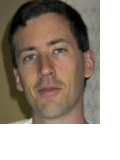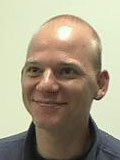|
|
Presentation: "Panel: What will the future of Java development be?"
Time:
Wednesday 17:15 - 18:15
Location:
City
Abstract: The Java of today bears little resemblance to the 1.0 Java release in 1995 - Swing, Java EE, Java ME, Generics, Annotations,
and Dynamic languages are a few examples of major changes or innovations which have occurred to the base Java platform. Over
the course of the last 12 years, the Java language and the associated APIs have grown and adopted to match a wide variety of
applications.
This panel discussion with several influential leaders of the software development community will discuss and debate how
the Java language and APIs will look in the future based upon the lessons we have learned from the past. In particular, it
will focus on how application development will change, and the variety of enabling features that we can expect to have
available to us as developers in the next few years, starting with Java 7.
|
Joshua Bloch

Joshua Bloch, Google's chief Java architect and a former Distinguished Engineer at Sun Microsystems, won the prestigious Jolt Award from Software Development Magazine for his book, Effective Java Programming Language Guide.
At Sun, he led the design and implementation of numerous Java platform features, including JDK 5.0 language enhancements and the award-winning Java Collections Framework. He holds a Ph.D. in computer science from Carnegie-Mellon University and is most recently the co-author, with Neal Gafter, of Java Puzzlers.
Chet Haase, Sun Microsystems

In his work with Sun Microsystems, Chet Haase is in a unique position to discuss the current status of Java. Co-author of an upcoming book on developing desktop Java effects, he joins Phil, Scott, and Ben to talk about how Sun is working on improvements to the consumer Java client.
Chet first reviews his background and how he came to work for Sun Microsystems. The talk then turns to the company's applet strategy. The group also evaluates the status of JavaFX scripting. The conversation is technical in nature, but interesting in its review of an important tool in online technology.
Charles Nutter, Sun

Charles Nutter has been a Java developer since 1996, recently working as the senior Java architect at Ventera Corp and in September moved to Sun to work full-time on JRuby! He led the open-source LiteStep project in the late 90s and came to Ruby in the fall of 2004.
Since then he has been a member of the JRuby team, helping to make it a true alternative Ruby platform. Charles presented JRuby at RubyConf 2005 and co-presented at JavaOne 2006 with Thomas Enebo. He hopes to co-write a JRuby book this fall with Thomas to follow up a planned JRuby 1.0 release.
Rod Johnson, Creator, Spring

Rod is the father of Spring. The Spring Framework open source project began in February 2003, based on the Interface21 framework published with Rod's best-selling Expert One-on-One J2EE Design and Development.
Rod is one of the world's leading authorities on Java and J2EE development. He is a best-selling author, experienced consultant, and open source developer, as well as a popular conference speaker.
Rod's best-selling Expert One-on-One J2EE Design and Development (2002) was one of the most influential books ever published on J2EE. The sequel, J2EE without EJB (July 2004, with Juergen Hoeller), has proven almost equally significant, establishing a comprehensive vision for lightweight, post-EJB J2EE development.
Rod has extensive experience as a consultant in a wide range of industries: principally, finance, media and insurance. He has specialized in server-side Java development since 1996. Prior to that, he worked mainly in C and C++. His experience as a consultant has led him to see problems from a client's perspective as well as a technology perspective, and has driven his influential criticism of bloated, inefficient, orthodox approaches to J2EE architecture, which have delivered very poor results for stakeholders.
Rod is the founder of the Spring Framework, which began from code published with Expert One-on-One J2EE Design and Development. Along with Juergen Hoeller, he continues to lead the development of Spring.
He regularly speaks at conferences in the US, Europe and Asia, including the ServerSide Symposium (2003, 2004, 2005 and 2006), JavaPolis (Europe's leading Java conference) in 2004 and 2005, JavaZone (2004 and 2005) and JAOO (2004). He was awarded a prize for giving one of the top 20 presentations (by evaluation) at JavaOne in 2005, and delivered keynotes at the JavaWorld conference in Tokyo, June, 2005, the JAX conference in Munich (October, 2005) and the Spring Experience conference in Bal Harbour, Florida, in December 2005.
Rod serves in the JCP on the Expert Groups defining the Servlet 2.4 and JDO 2.0 specifications. His status as a leader in the Java community has been recognized through his invitation to Sun's Java Champions program. Rod continues to be actively involved in client projects at Interface21, as well as Spring development, writing and evangelism.
Erik Meijer, Creator, LINQ

Erik Meijer is an architect in the Microsoft SQL server division where he currently works together with the Microsoft Visual C# and the Microsoft Visual Basic language design teams on data integration in programming languages.
Prior to joining Microsoft he was an associate professor at Utrecht University and adjunct professor at the Oregon Graduate Institute.
Erik is one of the designers of the standard functional programming language Haskell98 and more recently the Cw language.
|
 |









